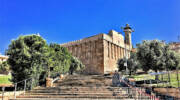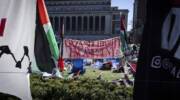More than 50 Israeli wineries, together with international brands, were displayed in the “Sommelier 2018” exhibition this month in Tel Aviv.
By Eliana Rudee/JNS
Israeli winemakers say that, just like the beverage they produce, their industry is growing better with age.
More than 50 Israeli wineries, together with international brands, were displayed in the “Sommelier 2018” exhibition from Jan. 15-16 in Tel Aviv. In the past, this gathering—Israel’s largest annual wine event—was only open to professionals in the industry. But this year, it was opened to the public in the evenings.
In the past few years, Israeli exports of wine and spirits have been consistently growing at around six percent annually, according to the Israel Export Institute.
“In comparison to how small and young we are, it’s quite amazing to see the accomplishments of Israeli wines,” said Ayala Singer, director of marketing development for the 35-year-old Golan Heights Winery, one of Israel’s veteran wineries.
Singer has seen the winery evolve dramatically during the last decade—on a parallel track with the Israeli wine industry.
‘Leading the Flag of Wine Culture’
“The industry has developed tremendously, and the amount of quality wine is growing year by year,” she told JNS. “Everybody wants to be at the cutting edge of quality and innovation, and is searching for the unique essence of Israeli wine. We like to believe that we have some say in the development of the industry and are leading the flag of wine culture.”
Most of the industry in Israel uses international grapes from Western Europe, brought by Baron Edmond James de Rothschild from France 150 years ago. But recent wine trends have seen a move towards the use of local Israeli grapes, specifically the ancient Bittuni and Marawi varieties, which flourish in their indigenous climate and soil.
Recanati Winery was the first to restore Marawi and Bittuni in the Judean hills of Bethlehem, and Barkan Winery is following suit.
Dr. Shivi Drori, co-owner of Gvaot Winery and head of the Wine Research Center at Ariel University, where he lectures on the indigenous grapes of Israel, said, “To understand the varieties, we are collecting archaeological remains of grapes from archaeological sites around Israel, matching them to existing varieties.”
“Surveying the whole country, we found more than 600 vines, and after analyzing them genetically, we found 80 unique Israeli varieties, which is a huge amount,” claimed Drori. “We are now characterizing them, trying to find which are suitable for quality wine production. We currently have in our hands 10 varieties that show high wine quality and make for very interesting, full-bodied wines.”
Wines Used in Time of King David
The local grape varieties have not only found success in entering the Israeli industry—they are also changing Israel’s wine narrative. Drori said, “Today the story of a wine is as important as its quality, if not more important. Part of my job to help the Israeli wine industry make its story, and reconnect to its biblical roots, to the 4,000-year-old story of wine-making.”
He argued that when pricing wine, one must compare six-year-old and 600-year-old bottles not just on their quality, but also on their story. He hopes that in a few years, every Israeli winery will have at least one wine from local indigenous grape varieties.
“This will bring tourists to Israel,” he said.
“It’s not interesting to come for a cabernet wine, but the ones used 2,000 years ago in the time of King David? This is very interesting. People love the story,” added Drori.
BDS Movement Tries to Change Story of the Region
But just as Israel has begun to reclaim its historical connection to the region through wine, proponents of the anti-Israel BDS movement have tried to change the story of the region.
For many wineries in Judea, Samaria and the Golan Heights, the pressure of BDS is real. Singer recounted “a situation in Germany, where for a couple of hours, supermarkets took our wines off their shelves” but apologized hours later. But despite the BDS efforts, Golan Heights Winery’s exports are “rising year by year,” she said.
Likewise, Vered Ben Sadon, manager of marketing for Tura Winery in the Samaria region of Mount Gerizim, had sold grapes to wineries that have now terminated their partnership with Tura due to political reasons. But Tura has garnered awards in many international wine competitions, as blind tasting helps the Israeli wine industry dodge politics.
‘Every Day is Like a Miracle’
Ben Sadon and her husband Erez got married 22 years ago and as a young couple, they moved to Samaria to “to settle the land for religious reasons.” She said, “We began the winery in 2003 with 1,200 bottles. Today, we are producing 100,000 bottles a year. Our first wine came out in the market in 2006. We sent it to exhibition and got the first award internationally for our merlot, and today we have more than 50 awards, in the Czech Republic, France, England and in the most important competitions.”
“A big part of what we are trying to do is sell Israel as a product,” Ben Sadon told JNS.
She added, “Every day is like a miracle. We see it with our own eyes. Customers every year say they see a big change in wine quality. We are very proud of what we are doing.”
Do You Love Israel? Make a Donation - Show Your Support!
Donate to vital charities that help protect Israeli citizens and inspire millions around the world to support Israel too!
Now more than ever, Israel needs your help to fight and win the war -- including on the battlefield of public opinion.
Antisemitism, anti-Israel bias and boycotts are out of control. Israel's enemies are inciting terror and violence against innocent Israelis and Jews around the world. Help us fight back!






















